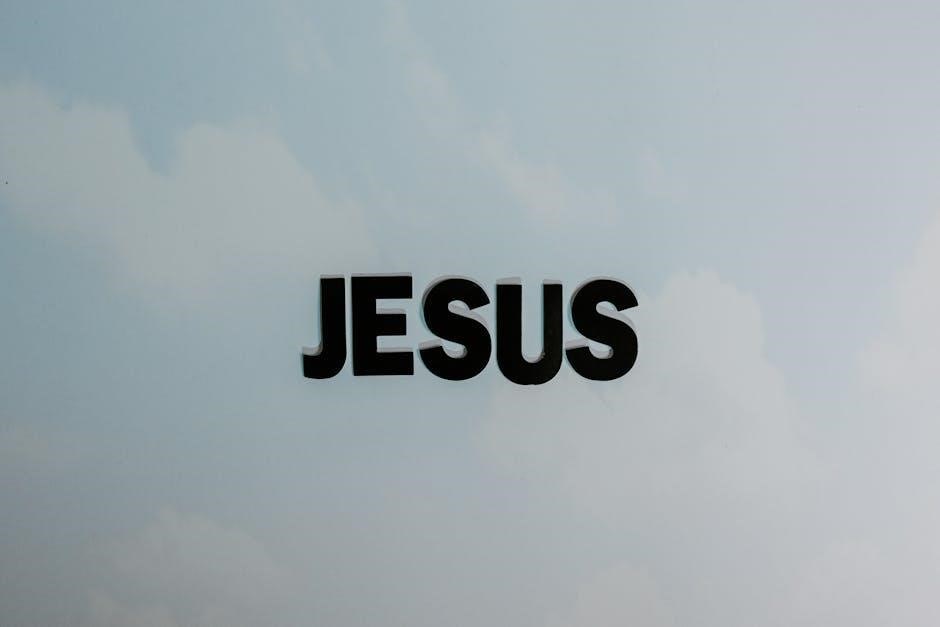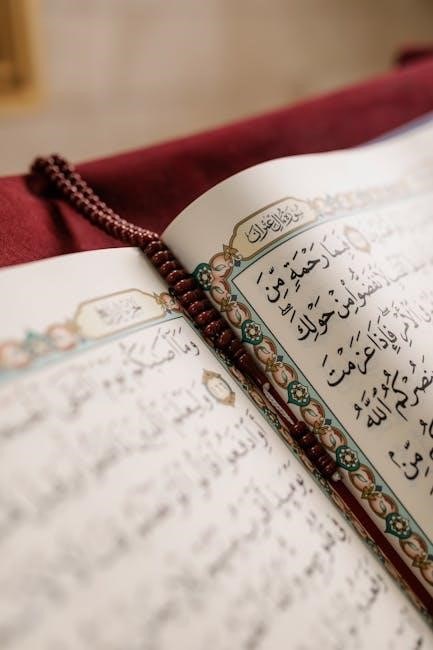Welcome to the 21 Days of Prayer and Fasting Guide, a transformative journey combining spiritual disciplines to deepen your faith and connection with God. This guide provides a comprehensive roadmap for 21 days of focused prayer and fasting, helping you prepare, stay committed, and experience spiritual renewal. Whether you’re seeking personal growth, healing, or guidance, this guide offers practical tips, biblical insights, and daily encouragement to support your journey. Embark on this powerful experience to draw closer to God and discover the profound benefits of prayer and fasting.
Overview of the 21-Day Prayer and Fasting Initiative
The 21-Day Prayer and Fasting Initiative is a global movement encouraging believers to dedicate 21 days to seeking God through prayer and fasting. This structured program fosters spiritual growth, renewal, and a deeper connection with God. Participants engage in various fasting methods, such as the Daniel Fast or partial fasting, while focusing on specific prayer themes each day. The initiative is widely adopted by churches and individuals worldwide, promoting unity and collective intercession. It aims to empower believers to overcome challenges, seek divine guidance, and experience transformative breakthroughs in their lives and communities.
Importance of Prayer and Fasting in Spiritual Growth
Importance of Prayer and Fasting in Spiritual Growth
Prayer and fasting are powerful spiritual disciplines that deepen your relationship with God and foster personal transformation. By combining heartfelt prayer with self-denial through fasting, you create space for God to work in your life. This practice humbles the heart, sharpens focus, and increases sensitivity to God’s voice. Fasting demonstrates dependence on God, while prayer invites His presence and guidance. Together, they clarify purpose, renew strength, and empower believers to live out their faith with greater intentionality. This 21-day journey is a proven pathway to spiritual growth, revival, and a deeper connection with God’s will and purposes.
How to Prepare for a 21-Day Fast
Preparing for a 21-day fast involves spiritual, physical, and mental readiness. Start by setting clear intentions and prayer goals. Consult a healthcare professional, especially if you have medical conditions. Gradually adjust your diet pre-fast to lighter meals and avoid heavy foods. Plan your prayer schedule and gather resources like a devotional or prayer journal. Stay hydrated by drinking plenty of water before fasting. Choose the type of fast that suits you best, such as a partial or Daniel fast. Seek support from a community or accountability partner to stay motivated. Mentally prepare for challenges and focus on spiritual growth throughout the journey.

Biblical Foundation of Prayer and Fasting
Prayer and fasting are deeply rooted in biblical traditions, with Jesus, Esther, and Daniel exemplifying their power. These practices humbly seek God’s presence, guidance, and transformation, reflecting devotion and surrender.
Key Scriptures on Prayer and Fasting
Key scriptures on prayer and fasting highlight their significance in seeking God’s presence and humble obedience. In Matthew 6:16-18, Jesus teaches on fasting with humility. 2 Chronicles 7:14 emphasizes repentance and seeking God’s face. Isaiah 58:6-8 describes true fasting as loosening chains and feeding the hungry. Ephesians 6:18 urges persistent prayer for all believers. These verses guide believers to fast with purpose, seeking spiritual renewal and deeper connection with God. They remind us that fasting is not just about abstaining from food but about drawing near to Him in humility and devotion.
Examples of Fasting in the Bible
The Bible provides powerful examples of fasting, demonstrating its significance in seeking God’s presence and guidance. Moses fasted for 40 days before receiving the Ten Commandments, while Elijah fasted during his 40-day journey to Mount Horeb. Jesus fasted for 40 days in the wilderness, preparing for His ministry. These examples highlight fasting as a means to deepen spiritual focus, seek divine intervention, and align with God’s will. Such biblical precedents inspire modern believers to embrace fasting as a transformative spiritual practice, mirroring the commitment seen in Scripture.
The Role of Prayer in Fasting
Prayer is the heartbeat of fasting, serving as a powerful means of communication with God. It allows believers to seek His will, guidance, and strength during the fast. Through prayer, individuals focus on spiritual growth, intercede for others, and align their hearts with God’s purpose. Fasting without prayer is merely abstaining from food; prayer infuses fasting with spiritual significance. It creates a deeper connection with God, enabling believers to humble themselves and seek divine intervention in their lives and the lives of others. Prayer keeps the focus on spiritual renewal, ensuring that fasting is not just physical but profoundly spiritual.

Purpose and Benefits of 21 Days of Prayer and Fasting
The 21-day prayer and fasting initiative aims to deepen spiritual renewal, seek divine guidance, and foster a closer relationship with God, promoting healing and personal transformation.
Spiritual Renewal and Revival
Engaging in 21 days of prayer and fasting opens the door to profound spiritual renewal and revival. This period fosters a deeper connection with God, allowing believers to refocus on their faith and experience transformation. Through dedicated prayer and fasting, individuals often report a renewed sense of purpose, clarity, and spiritual strength. Collective efforts, such as the Awakening initiative involving over 800 churches, demonstrate the power of united prayer and fasting in sparking revival. Personal testimonies, like Chris Pratt’s Daniel Fast journey, highlight how this practice can lead to spiritual rejuvenation and a stronger walk with God.
Seeking God’s Guidance and Wisdom
Prayer and fasting are powerful tools for seeking God’s guidance and wisdom. Through dedicated time with God, you can gain clarity on life’s decisions, discern His will, and walk in purpose. Fasting humbles the heart, making it receptive to God’s voice, while prayer fosters a deeper connection with Him. Many believers use the 21-day fast to seek divine direction for personal, relational, or vocational challenges. By combining prayer with fasting, you create space for God to speak, revealing His plans and imparting wisdom. This spiritual practice aligns your heart with God’s, ensuring His guidance becomes the foundation of your decisions and path.
Building a Deeper Relationship with God
Prayer and fasting are powerful tools for seeking God’s presence and deepening your relationship with Him. Through daily devotion and reflection, this 21-day journey helps you align your heart with God’s will, fostering intimacy and spiritual sensitivity. By prioritizing prayer and self-reflection, you create space to hear His voice and experience His grace more profoundly. This practice not only strengthens your faith but also draws you closer to God, enabling you to walk in greater harmony with His purpose for your life. Embrace this transformative experience to cultivate a more personal and meaningful connection with Him.
Physical and Emotional Benefits of Fasting
Fasting offers numerous physical and emotional benefits, complementing its spiritual purpose. Physically, it promotes weight loss, improves metabolism, and aids in detoxification. Mentally, it enhances clarity, reduces stress, and boosts self-discipline. Many participants report feeling more energized and focused. Emotionally, fasting fosters patience, gratitude, and a deeper sense of self-awareness. These benefits align with the spiritual goals of the fast, creating a holistic transformation. By incorporating prayer, the experience becomes even more enriching, nurturing both body and soul. This 21-day journey is designed to rejuvenate your entire being, helping you achieve balance and renewal in all areas of life.

How to Structure Your 21-Day Prayer and Fasting
Start by setting clear intentions and goals for your fast. Create a daily prayer schedule, focusing on specific themes like repentance, healing, or provision. Choose a fast type that suits your lifestyle, such as a Daniel or partial fast. Stay hydrated, rest well, and seek community support to maintain focus and endurance throughout the journey.
Setting Goals for Your Fast
Setting clear goals for your 21-day fast is essential to stay focused and maximize spiritual benefits. Identify your purpose: is it for spiritual growth, seeking God’s guidance, healing, or strengthening relationships? Reflect on areas where you desire transformation. Write down specific, measurable objectives, such as dedicating daily time for prayer or studying Scripture. Categorize goals into personal, relational, and communal aspects. Pray for clarity and prioritize areas needing divine intervention. This structured approach ensures your fast remains intentional and aligned with God’s will, fostering a deeper connection and lasting impact. Keep your goals visible to stay motivated throughout the journey.
Creating a Daily Prayer Schedule
Creating a daily prayer schedule is essential for staying consistent during your 21-day fast. Begin by designating specific times for prayer, such as early morning or evening, to align with your routine. Start with thanksgiving, praising God for His blessings. Transition into repentance, acknowledging areas needing spiritual growth. Dedicate time for intercession, praying for others and global issues. Conclude with worship, focusing on God’s sovereignty and love. Include reflection and journaling to capture insights and track progress. Keep your schedule realistic and flexible, ensuring it fosters intimacy with God. Consistency will deepen your spiritual connection and discipline throughout the fast.
Choosing the Type of Fast
Choosing the right type of fast is crucial for a successful 21-day prayer and fasting journey. Options include a Daniel Fast, which focuses on fruits, vegetables, and whole grains, or a partial fast, such as abstaining from food from sunrise to sunset. A full fast involves refraining from both food and drink, though this is typically shorter due to health considerations. Other forms, like a media or social media fast, allow flexibility while maintaining spiritual focus. Consider your physical health, spiritual goals, and lifestyle to select the fast that aligns best with your needs. Seek guidance if unsure.
Preparing Spiritually and Mentally
Preparing spiritually and mentally for a 21-day fast is essential for a successful and meaningful experience. Begin by prayerfully reflecting on your intentions and surrendering your heart to God. Seek support from a community or accountability partner to stay motivated. Mentally, set realistic expectations and understand that challenges like hunger or fatigue are natural. Focus on spiritual growth rather than physical perfection. Hydrate well before starting and plan for rest when needed. Journaling your thoughts and prayers can also help track your progress and deepen your connection with God. Spiritual preparation ensures a fruitful and transformative fasting journey.

Types of Fasts for the 21-Day Guide
Explore various fasting methods, including partial, Daniel, and full fasts, each tailored to meet unique spiritual goals and physical needs during your 21-day journey.
Partial Fast: Fasting from Sunrise to Sunset
A partial fast involves abstaining from food and drink from sunrise to sunset, typically lasting 12-14 hours. This method is ideal for those new to fasting or with health concerns. During the fasting period, only water or herbal teas are consumed. Eating occurs before sunrise and after sunset, allowing for spiritual focus during daylight hours. Many find this approach sustainable and effective for maintaining daily routines while deepening prayer life. It’s a balanced way to prioritize spiritual disciplines without extreme physical strain, fostering a stronger connection with God and clarifying life’s purpose through consistent prayer and reflection.
Daniel Fast: Eating Only Fruits, Vegetables, and Whole Grains
The Daniel Fast, inspired by Daniel’s biblical practices, involves consuming only fruits, vegetables, and whole grains while abstaining from meat, dairy, sugar, and processed foods. This fast focuses on spiritual discipline and prayer, emphasizing a commitment to seeking God. It is often adopted for 21-day periods, encouraging participants to dedicate time to prayer and reflection. By eliminating unhealthy foods, the Daniel Fast promotes physical and spiritual cleansing. Many churches and individuals choose this fast for its balanced approach, allowing for nourishment while maintaining a sacrificial mindset. It is an excellent option for those seeking a structured yet sustainable fasting experience;
Full Fast: Abstaining from Food and Drink
A full fast involves completely abstaining from all food and drink for the entire 21-day period. This intense form of fasting requires significant spiritual focus and dedication. It is essential to approach this fast with careful preparation, ensuring physical and mental readiness. Many participants find this type of fast deeply transformative, as it heightens their prayer life and devotion to God. However, it is crucial to consult with a healthcare provider before starting, especially for those with health conditions. This fast is not recommended for everyone, but for those who can undertake it, it can lead to profound spiritual breakthroughs and a deeper connection with God.
Other Forms of Fasting
Beyond traditional fasting methods, there are alternative approaches that cater to different needs and lifestyles. A tech fast involves abstaining from digital devices to focus on prayer and reflection. Social media fasting is another form, where individuals avoid platforms to reduce distractions and deepen spiritual focus. Some opt for activity-based fasts, abstaining from hobbies or entertainment to prioritize prayer. Additionally, juice or soup fasts allow for limited nourishment while maintaining a fasting mindset. These creative approaches emphasize flexibility, enabling individuals to tailor their fasting experience to personal circumstances while staying committed to spiritual growth and prayer.
Practical Tips for Success in the 21-Day Fast
- Stay hydrated by drinking water regularly.
- Plan balanced meals during eating windows.
- Listen to your body to avoid overexertion.
- Engage in daily prayer and reflection.
Staying Hydrated During the Fast
Staying hydrated is crucial during your 21-day fast to maintain physical health and mental clarity. Drink plenty of water throughout the day, especially if you’re engaging in a partial or Daniel fast. Consider incorporating herbal teas or electrolyte-rich beverages to replenish lost salts. Avoid sugary drinks that may hinder your fasting goals. If fasting from sunrise to sunset, ensure you hydrate well during eating windows. Listen to your body and drink when needed, as dehydration can lead to fatigue and dizziness. Prioritize water intake to support your spiritual and physical journey during this transformative period.
Managing Hunger and Physical Weakness
During your 21-day fast, hunger and physical weakness are natural challenges. To manage them, stay hydrated with water and herbal teas, and consider incorporating water-rich foods like fruits and vegetables if your fast allows. Eat smaller, nutrient-dense meals before fasting periods to stabilize energy levels. Rest when needed, and pace physical activities to conserve strength. Focus on spiritual goals to stay motivated. Remember, hunger pangs are temporary, and fasting strengthens self-discipline. Trust in God’s grace to sustain you, and embrace the journey as a path to deeper spiritual and physical renewal.
Maintaining Mental and Emotional Focus
Maintaining mental and emotional focus during a 21-day prayer and fasting period is crucial for staying aligned with your spiritual goals. Establish a structured daily routine that includes set times for prayer, reading scriptures, or journaling to keep your intentions clear. Manage physical challenges like hunger by staying hydrated and incorporating light exercises to maintain energy levels. Engage with a supportive community or group to share experiences and gain encouragement, which can help mitigate feelings of isolation. Keep a clear purpose in mind and set small, achievable daily goals to maintain motivation. Practice mindfulness and have strategies to manage cravings or emotional triggers, such as redirecting thoughts to prayer. Allow yourself to rest when needed to prevent burnout, ensuring a balanced and focused journey throughout the fast.
Seeking Support from a Community
Engaging with a supportive community is vital during your 21-day prayer and fasting journey. Joining a group, whether through your church, online forums, or local gatherings, provides encouragement and accountability. Sharing experiences and prayers with others strengthens your commitment and deepens your spiritual focus. Many churches and organizations offer structured programs, including daily devotionals and group prayer sessions, to help participants stay motivated. Surrounding yourself with like-minded individuals fosters a sense of unity and purpose, making the challenges of fasting more manageable. Community support also offers practical advice and inspiration, helping you navigate the physical and emotional aspects of your fast.

Prayer Focus for Each Day of the Fast
Each day focuses on specific prayer points, guiding you through personal repentance, family blessings, community healing, and global issues. This structured approach helps deepen your spiritual journey.
Day 1-3: Prayers for Personal Repentance and Forgiveness
Begin your 21-day journey with a focus on personal repentance and forgiveness. Use these days to reflect on areas where you may have fallen short and seek God’s mercy. Pray for a humble heart, confessing sins and asking for cleansing. Invite the Holy Spirit to reveal areas needing repentance and surrender them to God. Scripture reminds us that confession and repentance lead to spiritual renewal. Spend time in prayer, acknowledging your need for forgiveness and asking for grace to walk in obedience. This foundational step prepares your heart for the spiritual growth ahead, aligning you with God’s will and purposes.
Day 4-6: Prayers for Family and Relationships
Days 4-6 focus on praying for your family and relationships, seeking God’s wisdom and healing. Lift up your loved ones, asking for unity, forgiveness, and strengthened bonds. Pray for guidance in resolving conflicts and for grace to nurture healthy relationships. Intercede for spouses, children, and extended family, trusting God to work miracles. Chris Pratt’s experience with the Daniel Fast highlights how prayer and fasting can transform family dynamics. Additionally, pray for wisdom in building godly relationships and for healing in broken ones. This period emphasizes trusting God to restore and bless your family, aligning them with His will and purposes;
Day 7-9: Prayers for Church and Community
During days 7-9, focus your prayers on your church and community; Pray for unity among believers, spiritual growth, and the church’s mission to spread God’s love. Ask for wisdom and strength for church leaders to guide the congregation effectively. Pray for outreach initiatives to impact the community positively. Intercede for healing and reconciliation within the church and neighborhood relationships. Request God’s protection and provision for community needs, such as food, shelter, and peace. Pray for revival and a renewed sense of purpose among believers. Seek God’s grace to strengthen bonds and bring transformation to your church and community.
Use this time to bless others and seek divine intervention for collective challenges.
Day 10-12: Prayers for National and Global Issues
Dedicate these days to praying for national and global concerns, seeking God’s intervention in matters like leadership, peace, and justice. Intercede for world leaders, asking for wisdom and integrity. Pray for unity among nations and an end to conflicts. Lift up those affected by natural disasters, poverty, and injustice. Ask God to guide elections, fostering fairness and righteousness. Pray for global revival and the spread of the Gospel. Use scripture to underpin your prayers, such as Psalm 2:10-12, and seek God’s will for humanity. Remember, your prayers can influence the course of history and bring hope to a world in need.
Day 13-15: Prayers for Healing and Deliverance
Dedicate days 13-15 to prayers for healing and deliverance, seeking God’s restoration in every area of your life. Focus on spiritual, physical, and emotional healing, asking God to break chains of sickness or bondage. Pray for breakthroughs in relationships and circumstances, trusting in His power to deliver. Use scriptures like Isaiah 53:5 and Matthew 8:17 to affirm God’s will to heal. Intercede for others in need of healing and deliverance, believing in His faithfulness. End each day with thanksgiving, acknowledging God’s mercy and grace. This period is a powerful time to experience His transformative touch and liberation.
Day 16-18: Prayers for Provision and Blessings
Dedicate these days to praying for God’s provision and blessings in your life and the lives of others. On Day 16, focus on thanking God for His past faithfulness and current blessings. Reflect on how He has provided for your needs and trust Him for future Provision. On Day 17, pray for spiritual and material blessings, aligning your requests with His will. Day 18, intercede for others, asking God to bless those around you, including family, friends, and community. Trust in His faithfulness and seek His guidance in stewarding the blessings He provides. Stay committed and trust His divine plan.
Day 19-21: Prayers for Spiritual Growth and Empowerment
During these final days of the fast, focus on prayers for spiritual growth and empowerment. Seek a deeper understanding of God’s purpose for your life and ask for the Holy Spirit’s guidance. Pray for strength to overcome spiritual battles and for a heart that remains surrendered to God’s will. Request wisdom to apply the lessons learned during the fast and for boldness to share your faith. Ask for empowerment to live a life that glorifies God and impacts others. These prayers will help you conclude your fast with renewed passion and a stronger connection to God’s presence in your life.
Breaking the Fast After 21 Days
After completing the 21-day fast, reintroduce foods gradually to avoid health complications. Start with light, nutrient-rich meals and stay hydrated to ease your body back
How to Safely End Your Fast
After completing your 21-day fast, it’s crucial to end it wisely to avoid physical discomfort. Start with small portions of light, easily digestible foods like fruits, vegetables, or broth. Avoid heavy or rich meals initially. Gradually reintroduce foods over several days to allow your body to adjust. Stay hydrated with water or herbal teas. If you’ve fasted from both food and drink, begin with water before adding other liquids. Listen to your body and rest if needed. Reflect on your fasting experience, giving thanks for the spiritual growth and renewal you’ve experienced during this transformative journey. Prioritize health and grace in this transition.
Reflecting on Your Experience
Reflecting on your 21-day prayer and fasting journey is crucial for spiritual growth. Consider how God has worked in your life, the challenges you faced, and the breakthroughs you experienced. Evaluate the emotional and mental transformations, such as increased patience, clarity, or a deeper sense of purpose. Identify key lessons learned and how they can be applied moving forward. Celebrate victories, no matter how small, and acknowledge areas where you grew closer to God. Use this time to journal your insights, giving thanks for His faithfulness and grace throughout the fast. Reflection strengthens your resolve and deepens your relationship with Him.
Applying Lessons Learned
After completing the 21-day prayer and fasting journey, it’s essential to apply the spiritual lessons and habits learned. Integrate the disciplines of prayer and fasting into your daily life, using them as tools for ongoing growth. Share your experiences with others to inspire and encourage them on their own spiritual journeys. Seek accountability through a supportive community to maintain the practices. Reflect on the insights gained and document them for future reference. Most importantly, allow the transformative power of this journey to shape your decisions and deepen your relationship with God. This will ensure lasting spiritual growth and empowerment.
Congratulations on completing the 21-day prayer and fasting journey! Continue nurturing your spiritual growth by integrating these practices into your daily life and seeking further guidance regularly.
Encouragement for Continuing Prayer and Fasting
Prayer and fasting are powerful tools for spiritual growth and transformation. Many churches and individuals worldwide participate in 21-day initiatives, finding renewed purpose and deeper connections with God. Leaders like Mike Bickle and Chris Pratt inspire others to embrace these disciplines, emphasizing their impact on personal and communal life. The Daniel Fast and other forms of fasting have become popular, showing how these practices can lead to clarity, healing, and empowerment. Remember, prayer and fasting are not just temporary commitments but lifelong journeys. Stay consistent, seek community support, and trust God to guide you beyond the 21 days into lasting spiritual renewal.
Resources for Further Spiritual Growth

For continued spiritual growth, explore additional resources such as prayer journals, devotional books, and online courses. Websites like International House of Prayer offer deep teachings on fasting and prayer. Community groups and church initiatives, such as The Awakening, provide structured programs and support. Leaders like Mike Bickle share insights on fasting to hasten spiritual renewal. Downloadable guides and video series can further enrich your journey. Engage with faith communities to stay motivated and inspired beyond the 21 days. These tools will help you maintain a strong spiritual practice and deepen your relationship with God.
Staying Committed to Your Spiritual Journey
To stay committed to your spiritual journey after the 21-day fast, prioritize consistency in prayer and reflection; Set daily reminders to maintain a strong connection with God. Join a spiritual community or accountability group to share experiences and gain encouragement. Reflect regularly on the lessons learned during your fast, applying them to everyday life. Celebrate small victories and seek guidance when challenges arise. Remember, spiritual growth is a lifelong journey, and ongoing prayer and fasting can deepen your relationship with God. Stay focused, remain faithful, and trust in His plan for your life.


